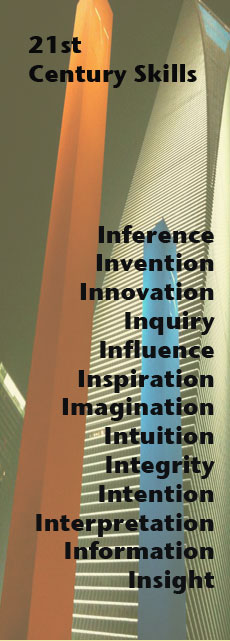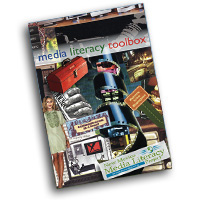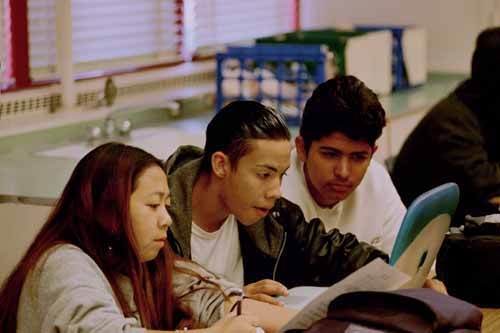
fno.org
|
|
| Vol 19|No 3|January 2010 | |
| Please feel free to e-mail this article to a friend, a principal, a parent, a colleague, a teacher librarian, a college professor, a poet, a magician, a vendor, an artist, a juggler, a student, a news reporter or to anyone else you think might enjoy it. | |||
The 21st Century Skills
By Jamie McKenzie, ©2010, all rights reserved. |

© 2010, J, McKenzie, all rights reserved. Schools may make copies for use with students at no cost. Any other group must write for permission. |
||
|
While this list of thirteen competencies is not complete, sufficient or exhaustive, it does focus on a group that is especially apt for these times. In a future article, I will also offer a set of competencies that begin with the letter "C" - a list that teachers originally invented when I was a superintendent in New Jersey. We called it "A Curriculum of Concern." In too many of the skills listings for this century, little attention is devoted to family, community, society, caring or social justice.
Inference is required now more than ever. Students must know how to read between the lines, put clues together and fathom meanings that are not self-evident. They must look past the words. For more on this essential skill, take a look at "Reading Between Digital Line" at http://fno.org/mar09/digitallines.html Almost all of the curriculum documents from groups such as ISTE, the AASL and the Partnership for 21st Century Skills emphasize the importance of students learning to create products that are fresh, novel and full of value, whether they be photographs, poems, mousetraps or solutions to pressing problems in the community. Closely related to invention, innovation requires that students know how to challenge and then modify what has been done in the past. Changing times place a premium on adaptability, flexibility and resourcefulness. Central to innovation is a firm grounding in synthesis strategies as outlined in "Bettering: A Synthesis Primer" at http://questioning.org/sum08/bettering.html True inquiry involves digging and delving into often baffling issues and questions in order to uncover or build new understandings, but the term is too often applied to scooping and gathering activities that have little to do with constructing ideas and meaning. These trivial pursuits (e.g., "Go find out about a significant person.") do not deserve the label "inquiry" as they are quite "lite" when it comes to the type of thinking required. They might be called "faux inquiry." When upgraded into something of import like "How will you know at the end of your life if you stood for anything and made a significant contribution?" then they deserve the label. Knowing and understanding serve little purpose if students do not learn to persuade others and try to gather support to shape events and outcomes. Persuasion involves effective communication as well as empathy - the capacity to understand the wishes, feelings and needs of others. Too many skill listings are weak on the emotional literacies that are a crucial aspect of converting ideas into realities. Students must learn to inspire others in addition to finding inspiration for themselves. Encouraging the inventiveness of others is a critical element in leadership or team play. Coming up with bold new ideas or strategies is a capability that can and should be developed. Contrary to some popular myths, inspiration need not be found at the bottom of a whiskey bottle. There are healthier sources and strategies that may be learned. The capacity to picture unusual possibilities is pivotal, yet few schools have done much in the past to develop these visual thinking skills. Scientists like Newton and Einstein credited visualization with having contributed mightily to their development of scientific models and theories. Imagination is a habit of mind that can be cultivated. Too many think of it as a gift of birth rather than a skill set. The savvy thinker or decision-maker heeds intuitive "inklings" while checking and balancing them against logical/analytical thinking. Sadly, the culture has paid too little attention to this kind of thinking or relegated it to a "New Age" category afforded little respect. Take a look at "When should we question and when should we trust our intuition?" at http://questioning.org/feb09/intuit.html Ethical literacy is often in short supply as TV programs are awarded to celebrities like Martha Stewart upon leaving prison. The entire world is reeling from an economic Tsunami fueled to some extent by greed and financial risk-taking as many bankers cashed in on a system of first granting and then unloading bad loans. The collapse of financial institutions for making fortunes on dubious loans and associated scandals such as Wall Street financier Bernard Madoff's $50 billion fraud highlight the need for increased awareness regarding the ethical dimensions of decisions. Without action of some kind, study and inquiry can be somewhat futile. We would expect students to translate their inventive ideas into improvements of various kinds. This is unlikely to happen if they are not clear about their intentions. Does the inquiry pass the test of "So what?" Is this a matter of import? Will the study lead to plans and designs? When many of the insights we need are obscured behind fog banks of data and Web sites that hope to sell us rather than inform us, students must learn to make up their own minds, construct their own meanings and figure things out with independence and savvy. They would otherwise be vulnerable to the manipulation, propaganda and Photoshopping so typical of these times. While it may not be a competency in the strict sense, because information is the fuel that feeds the inquiry process, students must learn to distinguish between data that is doubtful or unreliable and that which may be useful in clarifying an issue or developing understanding.
“There is nothing so terrible as activity without insight.” Goethe
|
|||
|
Copyright Policy: Materials published in From Now On may be duplicated in hard copy format if unchanged in format and content for educational, nonprofit school district and university use only and may also be sent from person to person by e-mail. This copyright statement must be included. All other uses, transmissions and duplications are prohibited unless permission is granted expressly. Showing these pages remotely through frames is not permitted. |
|||
Outline of chapters and description of book available here.
Order your copy of The Media Literacy Toolbox from the FNO Store




